Japan is facing the biggest rubella outbreak in a decade right now, and has recorded more than 5,000 rubella cases from January to April. In Wales, which is suffering a large measles outbreak, public health officials are warning about the potential for a rubella outbreak given about 38,000 people have not had their measles-mumps-rubella jab.
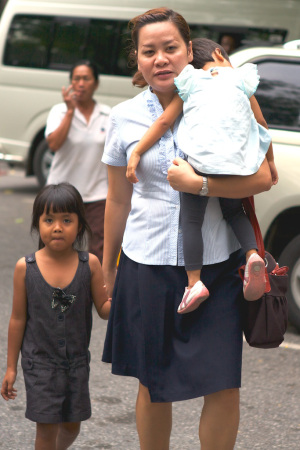 Rubella is usually a fairly mild illness. However, the real threat is for pregnant women who haven’t been vaccinated. A rubella infection in pregnancy, particularly in the first trimester, can have a devastating impact on the organs of a growing fetus. The damage can lead to fetal death, or a combination of serious complications including heart, hearing and vision problems. This is called congenital rubella syndrome. The commonly used acronym, “CRS” simply can’t say enough about the virus’s impact on children and their families. It can be completely prevented with an inexpensive vaccine, usually delivered in combination with measles vaccine. We met recently with a Thai family in Bangkok whose lives have been changed forever by congenital rubella syndrome. This is their story.
Rubella is usually a fairly mild illness. However, the real threat is for pregnant women who haven’t been vaccinated. A rubella infection in pregnancy, particularly in the first trimester, can have a devastating impact on the organs of a growing fetus. The damage can lead to fetal death, or a combination of serious complications including heart, hearing and vision problems. This is called congenital rubella syndrome. The commonly used acronym, “CRS” simply can’t say enough about the virus’s impact on children and their families. It can be completely prevented with an inexpensive vaccine, usually delivered in combination with measles vaccine. We met recently with a Thai family in Bangkok whose lives have been changed forever by congenital rubella syndrome. This is their story.
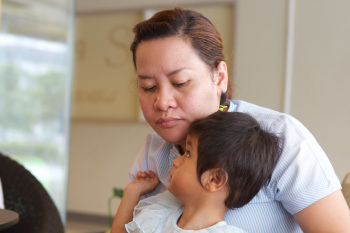 This is Kawinchida Sawengsri, known as “Chi”. She’s carrying her daughter, nicknamed “Im”, who is four years old. Im’s sister is called Ten – she’s six. When Chi was pregnant with Im, she says her husband was ill, and had a skin rash. Some days later she also fell ill with the same symptoms – the classic presentation of rubella. Chi went to the doctor and was told she would be fine. She was one month pregnant, but didn’t know it at the time. She says the pregnancy went smoothly enough.
This is Kawinchida Sawengsri, known as “Chi”. She’s carrying her daughter, nicknamed “Im”, who is four years old. Im’s sister is called Ten – she’s six. When Chi was pregnant with Im, she says her husband was ill, and had a skin rash. Some days later she also fell ill with the same symptoms – the classic presentation of rubella. Chi went to the doctor and was told she would be fine. She was one month pregnant, but didn’t know it at the time. She says the pregnancy went smoothly enough.
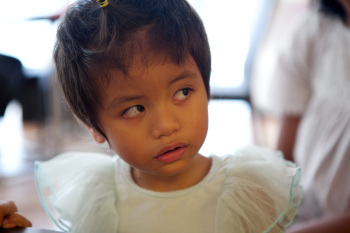 When Im was born it didn’t take long to realize she had problems with her vision. She had cataract surgery at five months. It also became clear that she couldn’t hear.
When Im was born it didn’t take long to realize she had problems with her vision. She had cataract surgery at five months. It also became clear that she couldn’t hear.
“Im is very deaf,” Chi explains “and has about 60% of her vision. She can see some depth including stairs, but she can’t hear and she can’t speak.” Chi says Im’s hearing improves somewhat with hearing aides.
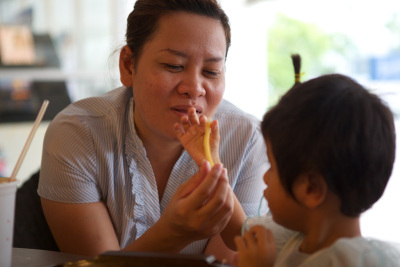 Chi says that Im’s disabilities have been very difficult for Im and the family. “It was especially stressful at the beginning,” says Chi. “There are so many needs to understand, and so many things we didn’t know.” Im is as independent as she can be, but she requires help to do almost everything – eat, dress and wash. Because she can’t speak, the family is extra attentive with her, watching to see what she needs at all times.
Chi says that Im’s disabilities have been very difficult for Im and the family. “It was especially stressful at the beginning,” says Chi. “There are so many needs to understand, and so many things we didn’t know.” Im is as independent as she can be, but she requires help to do almost everything – eat, dress and wash. Because she can’t speak, the family is extra attentive with her, watching to see what she needs at all times.
 Chi says her extended family has been wonderful. I’m’s grandmother (pictured left) helps to care for Im and Ten, as does Chi’s husband’s family. “They help out so much,” says Chi, who works at a bank. “Their support is important while I’m working, as we need the income from my job to pay the extra medical expenses.” Chi says they have been to many hospitals to have Im examined, but that treatments are very expensive.
Chi says her extended family has been wonderful. I’m’s grandmother (pictured left) helps to care for Im and Ten, as does Chi’s husband’s family. “They help out so much,” says Chi, who works at a bank. “Their support is important while I’m working, as we need the income from my job to pay the extra medical expenses.” Chi says they have been to many hospitals to have Im examined, but that treatments are very expensive.
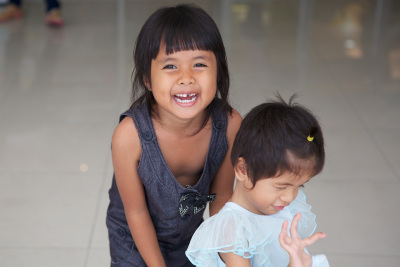 Im’s sister Ten is gentle with Im, and the two play together constantly. During our visit they held hands and ran up and down the corridors as many times as they could. Im will probably need her family to care for her for the rest of her life.
Im’s sister Ten is gentle with Im, and the two play together constantly. During our visit they held hands and ran up and down the corridors as many times as they could. Im will probably need her family to care for her for the rest of her life.
Chi says she sometimes blames herself for Im’s disabilities. She wishes she had been vaccinated against rubella. But she also says she was never really told about the rubella vaccine.
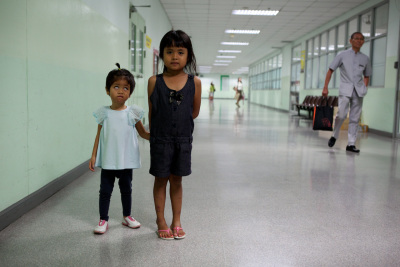 Chi doesn’t think too far into the future. She says the priority now is to get Im the best hearing aides she can afford, and maybe glasses that could help Im to see a bit better. Like any mother, Chi simply wants Im to have the happiest life possible.
Chi doesn’t think too far into the future. She says the priority now is to get Im the best hearing aides she can afford, and maybe glasses that could help Im to see a bit better. Like any mother, Chi simply wants Im to have the happiest life possible.
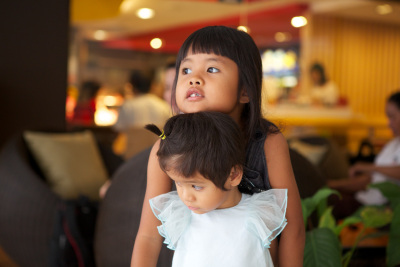 Rubella-containing vaccine is usually administered to babies and also to young women before they become pregnant. Currently, only about 40% of babies have access to the vaccine, mainly in middle and high-income countries. About 100,000 babies are born each year with congenital rubella syndrome. This could be completely avoided through vaccination. The Measles & Rubella Partnership, together with the GAVI Alliance, are working to expand access to combined measles-rubella (“MR”) vaccine.
Rubella-containing vaccine is usually administered to babies and also to young women before they become pregnant. Currently, only about 40% of babies have access to the vaccine, mainly in middle and high-income countries. About 100,000 babies are born each year with congenital rubella syndrome. This could be completely avoided through vaccination. The Measles & Rubella Partnership, together with the GAVI Alliance, are working to expand access to combined measles-rubella (“MR”) vaccine.
The MR vaccine costs less than $0.60 per dose under UNICEF’s pricing scheme, and a total of about $1.50 to deliver. In comparison, studies show that lifetime costs to care for and treat a child affected by congenital rubella syndrome in a country like Barbados, a middle-income country, is $50,000. In New York, the financial costs for CRS patients in supported housing are approximately $160,000 per person per year. The lifetime cost of caretaking and suffering for the child and their family is incalculable.
You can learn more about rubella and congenital rubella syndrome from the WHO, a Measles & Rubella Partnership founding partner.
Text and photos by Christine McNab, Measles & Rubella Partnership



















 Prelude Version 2.3.2
Prelude Version 2.3.2